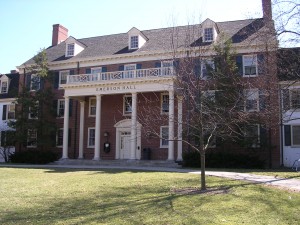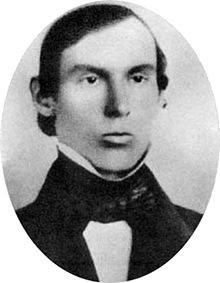No shepherd and one herd! Everybody wants the same, everybody is the same: whoever feels different goes voluntarily into a madhouse.
Friedrich Nietzsche, Thus Spoke Zarathustra
He was a bright young scholar who excelled at Ancient Greek and had a life-long appreciation for Goethe and Shakespeare. He deeply admired Emerson. He published prose and poetry until, after a certain episode, he was declared insane and committed to an asylum. After his release, his spent the last years of his life under the care of his sister, and died around the turn of the century.
I refer, of course, to Jones Very, born in Salem, Massachusetts in 1813. This American Transcendentalist (or, if the term weren’t already taken, “American Nietzsche”), is little remembered in scholarship or course syllabi. There appears to be just as much German language criticism of his poetry as English language criticism– not much. Yet Emerson thought this man worth remembering, and indeed, Very presents a valuable opportunity to scholars and students of American Romanticism to rethink the meaning of the Transcendentalist movement and the challenges it presented to New England Unitarian rationality. A serious examination of Very’s life, thought, and writings can also lead to a reassessment of his friend and champion, Ralph Waldo Emerson, restoring complexity to a man who was much more than the poetic optimist to which some critics reduce him.
Emerson was just enough of a radical in his day to be boring in ours. Harvard University banished him for his heretical “Divinity School Address” in 1838, but a century later, it named its philosophy building after him. Today students can sit in Emerson Hall and read his Address, astounded that it was ever considered dangerous, and completely miss its surviving radical potential. As early as the 1950s, Perry Miller lamented that Emerson’s “self-reliance” had become “market-speak”– code for a certain economic philosophy. While historians are still writing about Emerson, many scholars have stopped teaching him. My students at UW-Madison unanimously reported that they had learned, in high school, of a movement called Transcendentalism, and learned about some of its key figures (only Emerson and Thoreau, I assume, and maybe Margaret Fuller, because of her sex), but were never exposed to any of their writing!
Just three years ago, William Major and Bryan Sinche, both in the English department at the University of Hartford, published an acerbic article in the Chronicle of Higher Education called “Giving Emerson the Boot,” in which they advocated dropping him from courses on American literature altogether.* In “Giving Emerson the Boot,” Major and Sinche demonstrate a stubborn refusal to engage with Emerson’s historical context, they complain that his meaning is “hidden,” and they reduce the Concord Sage to a self-absorbed fool in rose-colored glasses who wouldn’t have had such faith in man or nature had he only lived to see the evils of the twentieth century.
After producing a passage of Emerson’s writing that may take skill and care to decipher, Major and Sinche declare dismissively: “That is the prose of a crazy person.” But their chief problem with Emerson– aside from the fact that he lived in the wrong century, a century that apparently saw no great evil– is, as they put it simply: “the ego.” A “crazy person” with an ego– is this all Emerson represents in the twenty-first century?
Want a crazy person? Jones Very once leapt up in the middle of a tutoring session at Harvard and cried to his students “Flee to the mountains, for the end of all things is at hand!” Want ego? Very declared himself the second coming of Christ. If students think Emerson’s “transparent eyeball” is “crazy,” introduce them to Jones Very.
Critics and admirers of Friedrich Nietzsche often link his mental breakdown to his ideas. “Live a few decades in Nietzsche’s head,” someone once told me, “and you’d go crazy, too!” Critics claim his mental collapse reveals the degenerate nature of his philosophy, while admirers romanticize Nietzsche’s “madness” as somehow a sign of his genius. I am nothing but skeptical and resistant to this attitude. Nietzsche was a thinker, a great thinker, who happened to be ill. There is such a thing as mental disease. I am not a scientist; I can’t diagnose Jones Very. He may well have suffered from a serious mental illness. But I would encourage scholars to think about the nature of his “insanity” and the reaction of his peers. Very proclaimed that he contained the spirit of Christ within him and 19th century New England declared him insane. Perhaps the New Light revivalists of the 18th century would have declared him regenerate instead. Massachusetts Bay Puritans declared Anne Hutchinson dangerous, for similar sins, and exiled her– quite a different sentence than the asylum. Indeed, Hutchinson had her followers among the Puritan establishment, and John Winthrop took her seriously as an intellectual challenge to the “correct” interpretation of Calvinism.
Emerson, who the Harvard elite would have had committed if they could, championed Very throughout his life and helped him publish work after his release from the asylum. Even the ecstatic Emerson, however, could not follow Very all the way. When Very showed Emerson some work he had produced “under the influence of the Holy Spirit,” Emerson famously retorted, “Can not the Holy Spirit spell?” Emerson struggled to find a balance between two competing tensions in Transcendentalism: the sanctity of subjective experience and the need for objective language to communicate this experience to others and form community. This is the problem at the heart of Transcendentalism: how can one be both independent man and interdependent citizen, a self-reliant individual and a member of society, part of the timeless Over Soul and speak the language of a specific time and place.
From Thoreau’s night in a Concord prison to Very’s time in an asylum, Transcendentalism represents a struggle to work out the relationship between the individual and society in a rapidly modernizing world (one of Very’s mental breakdowns occurred on a train, when he panicked about the speed at which he was moving, until he understood that the Holy Ghost carried him). Transcendentalism also represents a challenge to Enlightenment rationality, enforced in New England by the Unitarian elite. Jones Very serves as reminder that the Transcendentalist attempt to revise the relationship between the individual and society was not as simple as the Hallmark version of Thoreau (“Go confidently in the direction of your dreams, live the life you have imagined!”), and that the challenge to rationality was not always as abstract as Emerson’s “transparent eyeball.” Very suggests a darker side to Romantic thinking about society, the individual, and rationality– issues that Edgar Allen Poe explores so vividly in his most disturbing fiction.
I would like to see scholars and teachers further analyze the tensions at the heart of Transcendentalism, using Very as a foil for Emerson, and examine how Emerson heroically tried to hold together the competing impulses in his own thought. As long we laugh at, or allow our students to laugh at and dismiss, these figures’ serious beliefs, we are not doing our jobs as historians. We must understand the ideational world that created Jones Very, the culture that committed him, and the critique both he and Emerson levied against that culture.
_______________________________________
* William Major and Bryan Sinche, “Giving Emerson the Boot,” The Chronicle of Higher Education, January 17, 2010.



6 Thoughts on this Post
S-USIH Comment Policy
We ask that those who participate in the discussions generated in the Comments section do so with the same decorum as they would in any other academic setting or context. Since the USIH bloggers write under our real names, we would prefer that our commenters also identify themselves by their real name. As our primary goal is to stimulate and engage in fruitful and productive discussion, ad hominem attacks (personal or professional), unnecessary insults, and/or mean-spiritedness have no place in the USIH Blog’s Comments section. Therefore, we reserve the right to remove any comments that contain any of the above and/or are not intended to further the discussion of the topic of the post. We welcome suggestions for corrections to any of our posts. As the official blog of the Society of US Intellectual History, we hope to foster a diverse community of scholars and readers who engage with one another in discussions of US intellectual history, broadly understood.
What a great post! I’ve always been fascinated by Jones Very and I’ve been hoping to get around to reading and writing about him more at some point.
I think the tension you see in Emerson’s thought and in the larger Transcendentalist movement definitely needs more working through. In my own research I’ve found that Emerson often set up the tensions between the individual/communal, action/contemplation, and the One/the Many (among others) in terms of East/West. You see this, for example, in the “Plato” essay where Plato stands as the representative philosopher who could hold both East and West in balance. I argue it’s also in works like “Hamatrayea,” though not as explicitly.
Here’s hoping for more work along these lines!
not quite intellectual history, but a perhaps unexpected resonance. Vic Bondi, who was the founder of the great early 80s hardcore band Articles of Faith, named his next band Jones Very. Bondi was also an instructor of history at UMass at some point.
http://www.youtube.com/watch?v=IKrPhv0PFAM
Jones Very as a band name? I had no idea! That’s great.
This post is my first introduction to Jones Very. Thanks for that. Some thoughts and questions:
1. Has Emerson really been reduced to a “poetic optimist” among those today who even know who Emerson is (apart from the Major and Sinche example)? Aside: Ratner-Rosenhagen’s book should disabuse everyone of the view of Emerson as mere poet. …I know, I know—we’re the only ones reading her book.
2. Broadly speaking, what do we *really know* about how Emerson is being taught in terms of courses on history, English, and philosophy? I wonder how many courses really give him any time, and in which departments that time occurs. I’ve given more attention to Thoreau, using his “Civil Disobedience” essay in a course I taught on Citizenship.
3. Speaking of philosophy and Emerson, George Kateb in the only politcal philosopher I know that’s given serious attention to Transcendentalist thought (though Jennifer R-R mentions Stanley Cavell, if I recall correctly, in relation to Emerson). Here’s a review of a new book on Thoreau’s importance to philosophy. – TL
Thanks for that review, Tim! That looks really interesting. I know of a little work being done on Thoreau and political thought, and I heard an excellent paper at the USIH conference the last year it was held on Emerson/Parker style Transcendentalism and its influence on anti-slavery political thought. I would love to do/see more like this!
I would love to somehow conduct a comprehensive survey of who is teaching Emerson/Transcendentalism and how (since my research revolves around how mid-century intellectuals believed the American Renaissance writers should be used to guide American life)! My sense is that its mostly English departments, but maybe not so much anymore, if that Chronicle piece is representative (it may not be…)?
Great article on one of the most interesting (and most neglected) of 19th century American poets! Might I ask you, however, to correct the spelling of Edgar “Allan” Poe at the end? Also, the accurate quote Emerson gave on Very’s divine influence: “cannot the spirit parse & spell?”